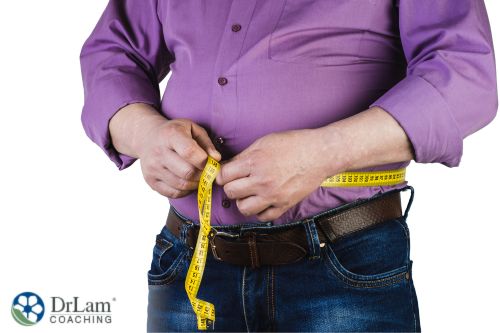 Have you been putting in the work at the gym and not seeing any results? You work at your exercise routine daily and are committed, but your hard work just doesn’t seem to be paying off. You may be thinking that you are doing something wrong and getting discouraged, but don’t quit yet. If you are working out but not losing weight, several factors could be contributing to your lack of results. From eating too much to not getting adequate sleep, you may simply be making small mistakes that can be fixed. Keep reading to learn more about the factors that could be impeding your weight loss goal even though you are exercising.
Have you been putting in the work at the gym and not seeing any results? You work at your exercise routine daily and are committed, but your hard work just doesn’t seem to be paying off. You may be thinking that you are doing something wrong and getting discouraged, but don’t quit yet. If you are working out but not losing weight, several factors could be contributing to your lack of results. From eating too much to not getting adequate sleep, you may simply be making small mistakes that can be fixed. Keep reading to learn more about the factors that could be impeding your weight loss goal even though you are exercising.
There are specific roadblocks you might be faced with if you notice that are working out but not losing weight. Here are some reasons to consider as you try to solve your weight puzzle:
If you’re exercising regularly and doing a mix of cardio and strength training, your body composition, which is the ratio of muscle to fat, is improving. That’s a good thing, but the scale may not be displaying any positive weight change. This is because some exercises cause you to gain muscle while you lose fat. However, muscle is denser and heavier than fat, which could translate to weight gain on your scale.
In addition, when you’re building muscle, your body retains water, a weight calculation that has nothing whatsoever to do with fat cells. Keep hitting the gym and working hard. A better weight gauge will show up in your clothing and bodily measurements. You can also purchase a body-fat scale capable of measuring your body composition via bioelectrical impedance analysis (BIA). With a BIA scale, you can get an accurate measurement of your body fat percentage and your actual weight.
If you are working out but not losing weight, it could be that you’re not moving enough throughout the day outside of when you perform your exercise routine. All the movement that you do during the day that‘s not exercise is referred to as non-exercise activity thermogenesis (NEAT). For instance, if your aerobic workout routine is on the intense side, fatigue may cause you to decrease non-exercise-related activities to aid in your post-workout recovery. However, this decrease can limit your weight loss.
Instead, you can be mindful about adding more movement throughout the day. Take the stairs, for instance, rather than the elevator. According to an article in Endotext, NEAT could be an essential tool for body weight control.
At the start of a new exercise regimen, your body is doing more work and using more of its energy reserves. This can increase your hunger, which is quite normal. As such, in response to hunger, some people, particularly athletes, tend to eat more food. If you overeat, you’ll find it difficult to lose weight.
Use a calorie calculator to help you determine the amount of calories that you should consume to avoid compromising your weight loss goal. High-protein foods such as eggs, poultry, and tuna, as well as high-fiber foods like whole grains and leafy vegetables, can help you to feel full for a longer time. Furthermore, high-fat foods can help you to feel satiated after a meal.
 Another reason why you may be working out but not losing weight is that you are eating too little. It can cause your resting metabolic rate to slow down, where you burn fewer calories throughout your day. Crash diets, for instance, are highly restrictive and rob your body of adequate nutrition. Consequently, you may experience low energy levels, and this can impact your ability to perform your workouts. With diminished energy to exercise, you burn fewer calories, which can cause weight gain. Additionally, research findings indicate that dieting can interfere with hormones like ghrelin which plays a key role in hunger regulation by keeping it at a high level.
Another reason why you may be working out but not losing weight is that you are eating too little. It can cause your resting metabolic rate to slow down, where you burn fewer calories throughout your day. Crash diets, for instance, are highly restrictive and rob your body of adequate nutrition. Consequently, you may experience low energy levels, and this can impact your ability to perform your workouts. With diminished energy to exercise, you burn fewer calories, which can cause weight gain. Additionally, research findings indicate that dieting can interfere with hormones like ghrelin which plays a key role in hunger regulation by keeping it at a high level.
Consider keeping a food journal and tracking your calorie and macronutrient intake to see how nutritional changes impact not only your hunger levels but also your weight.
Your weight loss goals may not be within reach, and that could be why you are working out and not losing weight. According to a 2021 study published in the International Journal of Qualitative Studies in Health and Well-Being, at the beginning of your weight-loss program, you need to set clear goals that are tailored to your specific needs on a continued basis, and this is linked to weight loss and maintenance. However, to attain your weight loss goals, they must first be realistic, or you risk failure.
You should create short-term goals and let them guide you in achieving your long-term goals. For instance, your long-term goal may be to lose 20 pounds in six months. As such, you may set a weekly goal of 1-2 pounds until you reach your 20-pound goal. Be sure to celebrate small achievements and get back to the drawing board if you fail to accomplish your goal.
Sleep and weight gain have been scientifically linked. If you are not getting adequate sleep, then you will compensate the next day by looking for other options to support your need for energy such as extra food or caffeine, both of which are capable of throwing your body’s natural rhythm off. It has been found that the more hours you are awake, the more you will eat. Furthermore, studies suggest that people who get under 4 hours of sleep nightly increase their risk of obesity compared to those who get 7 to 9 hours of sleep, which is the recommended amount for the average adult.
Believe it or not, if you are overly stressed, and not living mindfully in the present moment, your hormone levels will become unbalanced, and your cortisol levels will rise. Stress can be mental, emotional, or physical, but all forms cause your body to release cortisol, the stress hormone. Cortisol can and will influence weight gain. Chronic stress can lead to adrenal fatigue and NeuroEndoMetabolic (NEM) Stress Response dysregulation. This causes the digestive tract to slow down, both cholesterol and blood-sugar levels to increase, and the body to enter survival mode, in which it locks fat cells in place for future use. This could be the reason you have difficulty losing weight.
You can reduce your stress levels using meditation techniques such as yoga or deep breathing, which helps to minimize cortisol levels. Addressing any underlying stress and rebalancing your cortisol levels is also important.
 Unfortunately, weight gain (especially central weight gain) is very common with Adrenal Fatigue Syndrome(AFS), the non-Addison's form of adrenal dysfunction, where the body's stress response cannot keep up with life's chronic stressors. During AFS, when the body is severely overstressed and chronic fatigue has set it, the body enters survival mode to conserve energy. At this point, any attempt to lose weight will fail. You will have to first heal the adrenal glands, and restore balance to the bioenergetic circuit of the NEM stress response so it can properly perform its metabolic functions. After achieving this, your body will regain its balance, and the metabolic pathways will again be open for easier weight loss.
Unfortunately, weight gain (especially central weight gain) is very common with Adrenal Fatigue Syndrome(AFS), the non-Addison's form of adrenal dysfunction, where the body's stress response cannot keep up with life's chronic stressors. During AFS, when the body is severely overstressed and chronic fatigue has set it, the body enters survival mode to conserve energy. At this point, any attempt to lose weight will fail. You will have to first heal the adrenal glands, and restore balance to the bioenergetic circuit of the NEM stress response so it can properly perform its metabolic functions. After achieving this, your body will regain its balance, and the metabolic pathways will again be open for easier weight loss.
Furthermore, be careful with exercise in adrenal fatigue. Over-exercising may increase cortisol and lead to an adrenal crash. It is best to start with gentle exercise for shorter time periods until you are healthier.
Your body deserves a lot more credit than you give it. It’s smart, and it is always thinking of you. It will do its best to keep you from starving. When you lose more weight than it is comfortable with, it slows down the metabolism to store as many calories as it can. Guess what happens? You will reach a plateau in your dieting and be unable to lose any more weight.
No matter what, you must maintain a steady flow of calories, even as you work out. However, you can speed up your metabolism by utilizing several strategies, including eating more frequently, eating more protein, avoiding yo-yo diets, and getting adequate sleep.
When it comes to weight loss, your body needs water to break down the fat it stores. However, being that this process is not prioritized by the body, if you fall short on liquids, your body will halt that fat-burning process and use the water for more important bodily systems. Staying hydrated means your body has enough water to do everything it needs to function optimally. It is recommended that you at least drink 64 ounces a day to keep your body functioning properly.
Your particular workout program is one of the things that determines how soon you start losing weight. As such, the timing can vary significantly. For instance, if you walk briskly for 20 minutes, 4 days a week; or run for 20 minutes and do weightlifting 4 days a week, the energy expenditure for each will differ.
Studies indicate that weight loss takes place in two stages. The first stage can last several days or weeks and produce faster weight loss. The second stage of weight loss lasts months to years, with weight loss occurring at a slower rate, but fat loss is increased. Still, factors such as age, genetics, medical conditions, medications, stress, and sleep deprivation can impact how quickly you lose weight. As such, weight loss timing is not set in stone.
 If you have been working out and not losing weight in the two or three weeks since you began, this can leave you puzzled and discouraged. A few things could be getting in the way of you losing weight, including having unrealistic goals, your workout not being tailored to your needs, or needing to modify your diet.
If you have been working out and not losing weight in the two or three weeks since you began, this can leave you puzzled and discouraged. A few things could be getting in the way of you losing weight, including having unrealistic goals, your workout not being tailored to your needs, or needing to modify your diet.
As mentioned, your weight loss goal needs to be attainable if you want to be successful. Also, if you are an adrenal fatigue sufferer, your workout should be personalized to prevent burnout and adrenal crashes. Furthermore, your diet is also key. According to Rehman and Sarwan, sticking with a calorie deficit plan might be a good strategy to lose weight. However, eating unhealthy foods, inadequate sleep, stress, and an underlying health condition can thwart that effort.
If you find yourself in the position of working out and not losing weight, it is very important that you take a closer look at your lifestyle practices, diet, and workout habits to see what is stopping your progress. Consult with your healthcare provider before implementing any new weight loss techniques, or if you believe you may have additional problems that are prohibiting you from losing weight. Furthermore, patients who suffer from syndromes or illnesses such as adrenal fatigue must take care to maintain an appropriate diet and ensure they are primarily focusing on managing pre-existing conditions before focusing on weight loss elements.
Sarwan, Gurpreet, and Anis Rehman. "Management of Weight Loss Plateau." StatPearls, StatPearls Publishing, 24 Oct. 2022, www.statpearls.com/point-of-care/140318.
Spreckley, Marie, et al. "Perspectives into the Experience of Successful, Substantial Long-Term Weight-Loss Maintenance: A Systematic Review." International Journal of Qualitative Studies on Health and Well-being, vol. 16, no. 1, 2021, article 1862481, Taylor & Francis, doi:10.1080/17482631.2020.1862481. Accessed 28 Dec. 2023, www.pubmed.ncbi.nlm.nih.gov/33455563/.
von Loeffelholz, Christian, et al. "Non-Exercise Activity Thermogenesis in Human Energy Homeostasis." Endotext, edited by Kenneth R. Feingold et al., MDText.com, Inc., 25 Nov. 2022, www.pubmed.ncbi.nlm.nih.gov/25905303/.
You are working out and not losing weight for several reasons. You may be gaining muscle, not getting enough NEAT through the day or sleep, eating more or eating too little, having unrealistic goals, dealing with too much stress, relying too much on the scale, underestimating your body, and not drinking enough water.
